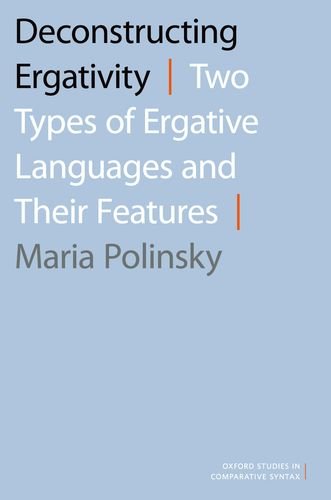Articoli correlati a Deconstructing Ergativity: Two Types of Ergative Languages...

Nominative-accusative and ergative are two common alignment types found across languages. In the former type, the subject of an intransitive verb and the subject of a transitive verb are expressed the same way, and differently from the object of a transitive. In ergative languages, the subject of an intransitive and the object of a transitive appear in the same form, the absolutive, and the transitive subject has a special, ergative, form. Ergative languages often follow very different patterns, thus evading a uniform description and analysis. A simple explanation for that has to do with the idea that ergative languages, much as their nominative-accusative counterparts, do not form a uniform class. In this book, Maria Polinsky argues that ergative languages instantiate two main types, the one where the ergative subject is a prepositional phrase (PP-ergatives) and the one with a noun-phrase ergative. Each type is internally consistent and is characterized by a set of well-defined properties.
The book begins with an analysis of syntactic ergativity, which as Polinsky argues, is a manifestation of the PP-ergative type. Polinsky discusses diagnostic properties that define PPs in general and then goes to show that a subset of ergative expressions fit the profile of PPs. Several alternative analyses have been proposed to account for syntactic ergativity; the book presents and outlines these analyses and offers further considerations in support of the PP-ergativity approach. The book then discusses the second type, DP-ergative languages, and traces the diachronic connection between the two types.
The book includes two chapters illustrating paradigm PP-ergative and DP-ergative languages: Tongan and Tsez. The data used in these descriptions come from Polinsky's original fieldwork hence presenting new empirical facts from both languages.
The book begins with an analysis of syntactic ergativity, which as Polinsky argues, is a manifestation of the PP-ergative type. Polinsky discusses diagnostic properties that define PPs in general and then goes to show that a subset of ergative expressions fit the profile of PPs. Several alternative analyses have been proposed to account for syntactic ergativity; the book presents and outlines these analyses and offers further considerations in support of the PP-ergativity approach. The book then discusses the second type, DP-ergative languages, and traces the diachronic connection between the two types.
The book includes two chapters illustrating paradigm PP-ergative and DP-ergative languages: Tongan and Tsez. The data used in these descriptions come from Polinsky's original fieldwork hence presenting new empirical facts from both languages.
Le informazioni nella sezione "Riassunto" possono far riferimento a edizioni diverse di questo titolo.
L'autore:
Maria Polinsky is Professor of Linguistics at the University of Maryland, College Park. She investigates the syntax of natural languages, with a particular emphasis on language universals and the range of variation in sentence structure. She has produced detailed syntactic analyses of a number of lesser-studied languages and has a long-standing interest in the ways different grammatical models can be used to analyze syntactic phenomena.
Le informazioni nella sezione "Su questo libro" possono far riferimento a edizioni diverse di questo titolo.
- EditoreOUP USA
- Data di pubblicazione2016
- ISBN 10 0190256583
- ISBN 13 9780190256586
- RilegaturaCopertina rigida
- Numero di pagine416
Compra nuovo
Scopri di più su questo articolo
EUR 147,52
Spese di spedizione:
EUR 2,43
In U.S.A.
I migliori risultati di ricerca su AbeBooks
Deconstructing Ergativity : Two Types of Ergative Languages and Their Features
Editore:
Oxford University Press
(2016)
ISBN 10: 0190256583
ISBN 13: 9780190256586
Nuovo
Rilegato
Quantità: 5
Da:
Valutazione libreria
Descrizione libro Condizione: New. Codice articolo 25069908-n
Compra nuovo
EUR 147,52
Convertire valuta
Deconstructing Ergativity : Two Types of Ergative Languages and Their Features
Editore:
Oxford University Press
(2016)
ISBN 10: 0190256583
ISBN 13: 9780190256586
Nuovo
Rilegato
Quantità: 5
Da:
Valutazione libreria
Descrizione libro Condizione: New. Codice articolo 25069908-n
Compra nuovo
EUR 154,12
Convertire valuta

